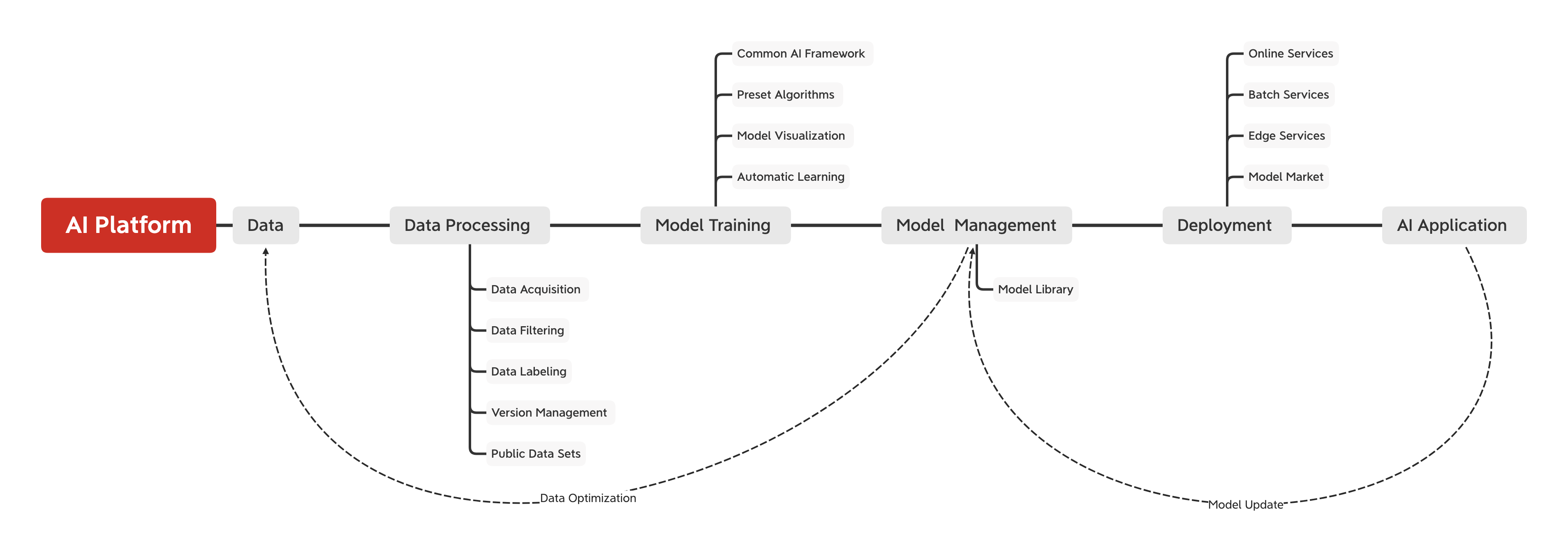AI Platform
A one-stop service platform from data processing, model training, service deployment to prediction

Role
Product Manager
Work Content
I designed prototype, defined product map, collaborated with the R&D team to deliver for the roll-out
Duration
Oct 2019 - Feb 2020 (4 months)
Skills
Competitive Analysis, survey design, user journey and procudt mapping, rapid prototyping, design management
PROBLEM
Provide a AI platform that everyone can afford
Machine learning is changing in many industries. Perhaps in a few years, people will no longer need a data science degree to use machine learning techniques, and machine learning could soon allow everyone to try to apply machine learning knowledge to their original fields. And we think that driving the implementation of machine learning technologies in different fields can also better feed back into machine learning research itself.
We hope to establish a low-cost, privacy, elasticity, security, and decentralized artificial intelligence computing platform to promote the development of AI.
CHALLANGE
What are the characteristics of this AI platform?
The one-stop machine learning platform means that, as long as users are ready for training data, whether they are data scientists, AI engineers or beginners, they can obtain low-threshold, highly flexible and zero-code custom model development tools.
Easy to use
Low cost
Flexible
Easy to use: Zero code development, train your own model through a visual drag operation.
Low cost: Support CPU / GPU mixed scheduling, efficient resource reuse and different methods suitable for customer scenarios.
Flexible: Support multiple mainstream open-source frameworks and exclusive use of exclusive resources.
PRODUCT AT A GLANCE
UniCloud AI Platform

We want to make AI development easier and more convenient. It provides an easy-to-use process for AI developers of all experience.
For business developers, they don't need to focus on models or coding to quickly build AI applications using automatic learning processes; for AI beginners, they don't need to focus on model development to build AI applications using pre-set algorithms; for AI engineers, we can also provide a variety of development environments, a variety of operating processes and patterns, which are convenient for developers to expand coding, quickly build models and applications.
Analysis and iteration
Continuous product iteration for product excellence
Functional definition Early, iterate quickly
After having the initial functional prototype, I spoke with the R&D engineers and product team at Unicloud in depth to see how the new design we brought to the AI platform was viewed within the team. This research helped us prioritize multiple product features, identify usability issues, define hardware resources and billing models that can be relied upon, and establish the team's resonance with the design object.
Clearly positioned to provide targeted product functionality
1
Notebook
1. The out-of-the-box Jupyter Lab environment with a variety of common frameworks and algorithms built in for a debug-and-run effect.
2. Auto-mount container for storing data.
2
Training Task
1. Provides various machine learning frameworks such as tensorflow, pytorch
2. Support versioning of training tasks.
3. Multiple billing models with flexible options.
3
Model Management
1. Support for multiple machine learning frameworks, matching models and parameters
2. Support for importing third-party models.
3. Provides flexible model version management.
4
Online Services
1. Supports multi-model, multi-version, multi-copy deployment.
2. Provide a diversion mechanism to facilitate control of data flows across models.
PROCESS
Iterate for product, design and development
In 12 weeks, I collaborated with developers, UX researchers, architects, to research, design, prototype, test and eventually we have launched a new AI platform on UniCloud.
